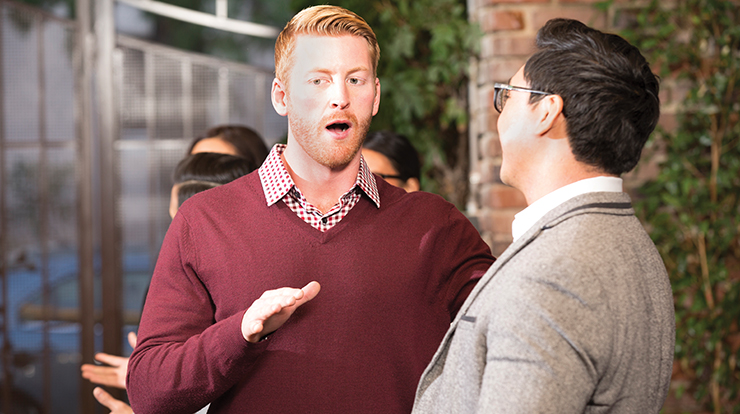A few years ago, I fell into a bad pattern with my wife: I would come home after a bad day, complaining about my coworkers, and my wife would reply with practical suggestions to improve the situation.
But that would only make me even more upset, and we would both walk away frustrated.
Why? Because we were having different kinds of conversations.
It’s easy to believe that some people are born great communicators, or we need to be charismatic or extroverted to connect with others. But what we’ve learned is exactly the opposite: Communication is a learned skill, and anyone can get better at it.
We’re living through a golden age of understanding the neurology of communication. Thanks to advances in neural imaging and data collection, research has shown that nearly every discussion is actually made up of three different kinds of conversation:
1
There is a practical conversation, where we are discussing What’s This Really About?, and the goal is to discover—and negotiate—what each person wants out of this discussion.
2
There is an emotional conversation, or How Do We Feel?, where the aim is to recognize—and reciprocate—vulnerability.
3
And there is a social conversation, Who Are We?, where each person explains how their background—where they grew up, where they work or went to school, who they are friends with, or how they see themselves—influences the ways they listen and speak.
Here’s the big insight: If you don’t know what kind of conversation is occurring, you’re unlikely to connect. This is known as the “Matching Principle of Communication.” To connect with someone, we need to be having the same kind of conversation, at the same time. If we want to be heard, and hear others, we need to recognize which kind of conversation is occurring, and match others and invite them to match us.
This, in fact, is what was happening with my wife: I was having an emotional conversation, and she was having a practical conversation; therefore, we had trouble hearing each other and connecting.
Every meaningful conversation is made up of countless small choices.
Recognizing what kind of conversation is occurring, and then matching that, is easier than it might sound. If we listen for clues, and look for opportunities, they often become obvious. For instance, if you’re chatting with a colleague before a meeting starts, and they mention they recently attended their kid’s graduation, they are hinting at an emotional experience. Instead of simply saying “Congratulations!” try to match them by asking “What was it like to watch your kid walk across the stage? Did it feel amazing?” Such a question invites—but does not mandate—an emotional response: “It was incredible. I felt so proud, and relieved, but also a little sad because it means she’s leaving home, you know?” If someone mentions a bit of office gossip, it might be a signal they are in a social mindset. If they start a conversation with “Okay, here’s what I want to talk about,” they are indicating they want a practical conversation.
Once we learn to recognize what kind of conversation is occurring—and match our companions and invite them to match us—it becomes a habit. This habit has helped save my relationship with my spouse. Now, when we talk to each other about something that might be challenging, we always start with a question: What kind of conversation are we having? My wife might ask “Do you want to solve this problem, or do you just need to get this off your chest?” It makes a huge difference. In schools, many teachers are told, when a student has something important to discuss, to ask “Do you want to be helped, heard, or hugged?” Those are the three conversations—practical, emotional, and social.
The good news is that anyone can become a supercommunicator—it’s just a series of skills to learn.
In this episode of The Toastmasters Podcast, Pulitzer Prize-winning journalist Charles Duhigg enlightens listeners on how to enhance their communication skills and become a “supercommunicator.”
The Skills of Supercommunicators
One skill is asking questions. Research shows that supercommunicators ask 10 to 20 times as many questions as the average person—but many of those questions (“What did you think about that?” “What did you say next?”) hardly register, except to make us feel like someone is listening. Other questions—what are known as “deep questions”—ask people to describe their beliefs, values, and experiences in ways that reveal something about themselves beyond the simple facts of their lives. (“How’d you decide to become a lawyer?” “What was it like growing up in a small town?”)
Supercommunicators are also good at reading the room: When a conversation gets stuck, they make it easy for everyone to take a quick break by bringing up a new topic or interrupting an awkward silence with a small joke.

What’s more, supercommunicators often engage in a process known as looping for understanding, which encourages everyone, including themselves, to listen more closely. Looping has three steps: Ask a question; repeat back what you heard in your own words; and then ask if you got it right. This is powerful because one of the strongest human impulses is social mimicry. If someone starts asking questions and looping their companions, everyone else becomes more likely to ask questions, listen closely, and loop in return.
All these skills have something important in common: They allow supercommunicators to show their companions they want to connect.
Take, for instance, laughter. Studies show that roughly 80% of the time when we laugh, it is not in reaction to anything funny. Rather, we laugh in response to something banal (“Are we finally going to dinner?”) to show that we want to connect with someone. And when they laugh back—the most natural reaction—they are showing us they want to connect with us, as well.
The same thing happens with other forms of non-linguistic communication. When someone frowns, or their voice goes quiet and intimate, we have an instinct to mimic them, to apply the Matching Principle of Communication. Supercommunicators listen to those instincts and nurture those urges, because they know that when we match someone, we show them we want to listen—and they become more willing to listen to, and trust, us.
We can all learn to hear more clearly, to speak so we’re easier to understand, to connect on a deeper level. And, today, learning to have meaningful conversations is, in some ways, more urgent than ever before. It’s no secret the world has become increasingly polarized, that we struggle to hear and be heard. If we know how to sit down together and listen, even if we can’t resolve every disagreement, we can find ways to coexist and thrive.
Every meaningful conversation is made up of countless small choices. There are fleeting moments when the right deep question, or a vulnerable admission, or a kind word can completely change a dialogue. A silent laugh, a barely audible sigh, a friendly expression during a tense moment: Some people have learned to spot these opportunities, to detect what kind of discussion is occurring, to understand what others really want. They have learned how to hear what’s unsaid and speak so others want to listen. And that’s important because the right conversation, at the right moment, can change everything.
3 Tips to Hone Your Supercommunicator Skills
1 Prepare before a conversation.
In one experiment focused on helping people reduce the anxiety associated with conversations, participants were asked to jot down a few topics they would like to discuss before a discussion began. This exercise took roughly 30 seconds, and often, the topics written down never came up once the conversation started.
But simply preparing a list, the researchers found, made conversations go better. There were fewer awkward pauses, less anxiety, and, afterward, people said they felt more engaged.
Whether you’re meeting a new manager for the first time, going out to coffee with a potential mentor, or trying to connect with a peer you admire, in the moments before a conversation starts, describe to yourself a few topics you might like to discuss. Being general is okay: Last night’s game or What you think about next quarter.
The benefit of this exercise is that even if you never talk about the things on your list, you have them in your back pocket if you hit a lull. By anticipating what you’ll discuss, you’re more likely to feel confident and prepared to have an interesting exchange.
2 Ask deep questions.
Once the conversation gets going, it’s time to throw in one or two deep questions to get to know each other in a meaningful way.
What exactly does a “deep question” entail?
A deep question asks someone to describe their beliefs, values, and experiences in ways that reveal something about themselves beyond the simple facts of their lives. It can be as light as “What would be your perfect day?” or as heavy as “What do you regret most?” Some deep questions may not even seem deep at first: “Tell me about your family” or “Why do you look so happy today?” Nonetheless, they are deep because they invite others to explain what makes them proud, worried, joyful, or excited.

Questions about facts (“Where do you live?”) often lead to a conversational dead-end (“I live in Boston”). However, those same inquiries, recast slightly (“What do you like about your neighborhood?”), invite others to share who they are (“I love that it’s close to the city, because I really enjoy walking to the theater downtown.”).
3 Ask follow-up questions.
One reason deep questions are so powerful is because they offer an invitation—without overstepping into a demand—for someone to reveal something personal.
But what should you do once you’ve asked a deep question? How do you keep the conversation going?
In 2016, a group of scientists from Harvard University began wondering the same thing. They scrutinized hundreds of conversations that had been recorded during events such as speed-dating meetups and gauged which conversations were successful (as measured by people saying they wanted to go on a real date) and which weren’t (people indicated they didn’t want to follow up). They found that during successful conversations, people tended to ask each other deep questions, but there was also another key finding: The best conversationalists asked follow-up questions that showed they were listening.
Conversations can change our brains, bodies, and how we experience the world.
Follow-ups are a signal “that you want to know more,” one of the researchers, Michael Yeomans, says. “They allow self-disclosure without it seeming like self-obsession.”
As Yeomans points out, one of the best things about follow-up questions is that they offer us an opportunity to reciprocate. Say your work friend finishes answering your deep question (“What was your favorite part of college?”) but fails to ask a question of their own. You can keep things flowing by answering the same question yourself, and then following up with another deep question (“Your favorite part of college was ultimate frisbee? Me too! Do you still love to play?”).
Why Connection Matters
In 2023, after over 80 years of studying the lives of thousands of people to see what characteristics made for happy, healthy, and successful lives, a group of scientists at Harvard published their results: “Good relationships keep us healthier and happier.”
In many instances, those relationships were established and kept alive via long and intimate discussions. Connecting with others can make us healthier, happier, and more content. Conversations can change our brains, bodies, and how we experience the world.
That said, there is no single right way to connect with other people. There are skills that make conversations easier and less awkward. There are tips that increase the odds you’ll understand your companions, and they’ll be more likely to hear what you are trying to say. The effectiveness of various conversational tactics waxes and wanes based on our surroundings, the types of discussion we’re having, the kind of relationship we hope to achieve. Sometimes we get there; sometimes we don’t.
But what’s important is wanting to connect. There are skills and insights that can help us satisfy our desire for connection, and they are worth learning, practicing, and making a commitment to. Because whether we call it love, or friendship, or simply having a great conversation with someone unexpected, connection—authentic, meaningful connection—is the most important thing in life.
Charles Duhigg is a Pulitzer Prize-winning journalist and author of the bestselling The Power of Habit and Smarter Faster Better. This article is based on content from his new book Supercommunicators.
Related Articles

Personal Growth
Create a Conversation Résumé

Communication
How to Have a Better Conversation

Communication
Be Confident in Casual Conversations

Communication



 Previous
Previous

 Previous Article
Previous Article